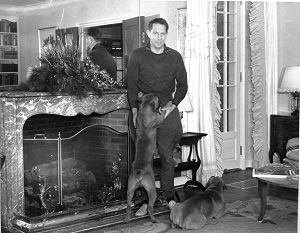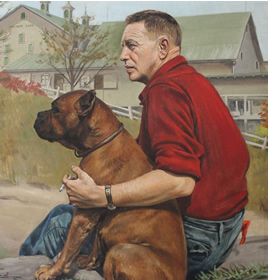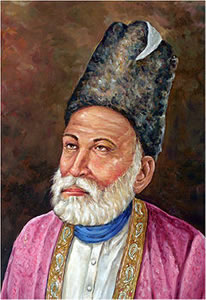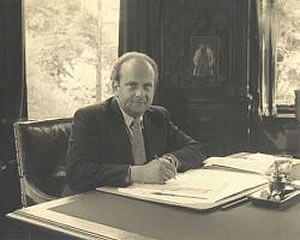De Amerikaanse schrijver en optredend artiest Bob Flanagan werd geboren op 26 december 1952 in New York. Hij leefde in Los Angeles, waar hij werd behandeld in het Long Beach Memorial Hospital. Hij overleed in 1996 43-jarige leeftijd stierf aan mucoviscidose. Bob Flanagan was SM-kunstenaar, bekend en geliefd binnen de SM-wereld en zelfs een beetje daarbuiten. Hij gaf performances en shows als stand-up comedian, maakte beeldende kunst en schreef. Een bevriende filmmaker legde Flanagans laatste jaren vast. Dit resulteerde uiteindelijk in een documentaire: ‘Sick- the life and death of Bob Flanagan – De film is geen freakshow. Het is het naakte verhaal van een mens met een geheel eigen manier van omgaan met CF.
Uit: Pain Journal
„Back in New York, the Gramercy Park Hotel. Back in bed. Forget what time it is-I mean who cares? It’s been an awful Christmas and an even worse birthday. Me, my whiny, wheezy, grumbling self, scaring the shit out of everyone, acting like I’m going to die at any moment. Still depressed. All I want to do is die-mean cry-I meant to write cry and I wrote die. How Freudian can you get?
*
Birthday party over-thank God. Success from the looks of it. People. Presents. Cake. But me? Where the hell was I? Laid out naked on the Gurney of Nails, big marzipan penis on my stomach, candles blazing. Everybody impressed at the sight of me, I guess-but I wasn’t really on the nails-not all of me-too chicken shit to let go. Couldn’t breathe. My idiot’s lament. Terrified at the sight of Sheree with her big knife, slicing into the marzipan penis-afraid she’d go too far-afraid of accidents, always afraid, so I can’t get into it, like I can’t get into anything these days. Always on the peripheral. Always terrified, exhausted, annoyed, pissed, anxious, out of it-out of the loop, out of my mind, out of time.
*
Horrible stomach aches and nausea. Heavy little shits. Is it the new antidepressant, the Wellbutrin? Don’t know if I’m sick or crazy. Short of breath everywhere I go. Making like I’m dying. Am I exaggerating? Why would I? Who am I trying to impress? All the time thinking I’m going to die, talking myself into a frenzy of phlegm and fatigue. Maybe I’m getting better. Maybe I’m not. Now they say I should exercise. First they say use the wheelchair and conserve your energy. Now they say “exercise.” Exercise/ wheelchair. Exercise/ wheelchair. Hard to know what to do or who I am in it all. And while I’m dwelling on death-Preston, 23 year old from cystic fibrosis summer camp, died a couple of days ago. Funeral tomorrow but I’m not going. Should have called him last week, but what would I have done, wished him luck?“
Bob Flanagan (27 december 1952 – 4 januari 1996)
De Oostenrijkse schrijver en essayist Klaus Hoffer werd geboren op 27 december 1942 in Graz. Hij studeerde germanistiek, klassieke talen en kunstgeschiedenis in Graz en promoveerde na een verblijf in de VS met een studie over het werk van Franz Kafka. Hij werkte als journalist en leraar. Hij ontving o.a. de Rauriser Literaturpreis en de Alfred-Döblin-Preis.
Uit: Die Nähe des Fremden
„Ich glaube, da
ss einer der Gründe, die einen dazu bringen, dass man versucht, Schriftsteller zu werden, in der mehrmals nach- und eindrücklich gemachten Erfahrung der Sprachlosigkeit liegt, weil man begreift, dass die Sprache als Vermittlungssystem nicht funktioniert, dass, um es anders, mit Urs Widmer, auszudrücken, der Schriftsteller entdeckt, dass er mit der Sprache nicht zurechtkommt, dass er sie nicht beherrscht.
Ich war immer ein Parteigänger der Ansicht, dass in einer vom Täter unbewusst unterstellten Affinität mit dem Opfer der Grund für dessen Verfolgung und Ausrottung zu suchen ist und dass, im Sinne der klassischen Rangdynamik in Gruppen, sozialen Minderheiten Charakterzüge unterstellt werden, die – nach Erik Erikson – zum Bestand der negativen Identität der Mehrheit gehören, zu den in ihre positive Identität unintegrierbaren Charaktereigenschaften, welche die Mehrheit auf die Minderheit projiziert und ihr anlastet. Jahrhunderte lang raffte man die Besitztümer der Juden mit der Rechtfertigung, diese seien so raffgierig, an sich. Ruth Klüger hat das Phänomen in ihrer autobiographischen Schrift weiter leben auf den Punkt gebracht. Sie stellt fest, dass es gerade jenen, die unermüdlich das Klischee vom goldgierigen jüdischen Shylock propagierten, also gerade den Nazis, vorbehalten blieb, ihren jüdischen Opfern in den Vernichtungslagern in beispielloser Gier noch die Goldzähne auszubrechen.
Umgekehrt, denke ich, führen soziale Minderheiten den „Auftrag“ der Mehrheit aus, das, was diese – in Eriksons Diktion – unterdrücken und verdrängen muss, weil sie es ablehnt oder für unzumutbar hält, zu leben. So arbeiten Minderheiten auch im kulturellen Sinn für die Mehrheit und ergänzen, was diese auslassen muss oder sich erspart. – Man erinnere sich der notorischen – wahrscheinlich ungeheuchelten – Tränen in den Augen von SS-Offizieren beim Klang der aufspielenden Juden- und Zigeuner-Orchester in den KZs, deren Mitglieder Minuten später ins Gas geschickt werden mochten.“
Klaus Hoffer (Graz, 27 december 1942)
De Indische dichter Mirza Ghalib (eigenlijk Asadullah Baig Khan) werd geboren op 27 december 1796 in Agra.Zie ook mijn blog van 27 december 2006 en ook mijn blog van 27 december 2008.
Let the ascetics sing of the garden of Paradise —
Let the ascetics sing of the garden of Paradise —
We who dwell in the true ecstasy can forget their vase-tamed bouquet.
In our hall of mirrors, the map of the one Face appears
As the sun’s splendor would spangle a world made of dew.
Hidden in this image is also its end,
As peasants’ lives harbor revolt and unthreshed corn sparks with fire.
Hidden in my silence are a thousand abandoned longings:
My words the darkened oil lamp on a stranger’s unspeaking grave.
Ghalib, the road of change is before you always:
The only line stitching this world’s scattered parts.
Vertaald door Jane Hirschfeld
The drop dies in the river
The drop dies in the river
of its joy
pain goes so far it cures itself
in the spring after the heavy rain the cloud
disappears
that was nothing but tears
in the spring the mirror turns green
holding a miracle
Change the shining wind
the rose led us to our eyes
let whatever is be open
Vertaald door W. S. Merwin and Aijaz Ahmad
Mirza Ghalib (27 december 1796 – 15 februari 1869)
De Duitse schrijver Carl Zuckmayer werd op 27 december 1896 geboren in Nackenheim am Rhein. Zie ook mijn blog van 27 december 2006 en ook mijn blog van 27 december 2008.
Uit: Geheimreport
“Nach der Tragödie Furtwängler – das Satyrspiel und die Rüpelkomödie: Emil. Ich muss vorausschicken, dass ich in diesem Fall Partei bin. Ich liebe die alte Sau. – Es geht mir hier, wie dem zu früh verstorbenen Conrad Veidt, dem der Emil seine erste Frau, die grande diseuse Gussy Holl, weggeheiratet hat, und der einmal sagte: »Das Dumme ist – ohne die Holl kann man ja auskommen, – aber ohne den Emil kann man auf die Dauer nicht leben.« – Daran ist etwas Wahres, – obwohl »die Holl« eine bezaubernde und hinreissende Frau war, – ausser der Massary hatte keine andere mehr diese ganz grosse – fast noch offenbachsche – Tradition und artistische Vollkommenheit des »leichten Stils«, – dabei ist sie ein sehr natürlicher, lebensvoller, starker und leidenschaftlicher Mensch, gescheit wie der Teufel, resolut und weiblich, Dame und »Kerl« zugleich, geistvoll, reizvoll, weltläufig und mit allen Humoren gesegnet, – selbst aus ihrer »Kälte« konnte in der Beziehung zu den paar Menschen, die sie gern hatte, ein merkwürdiges, knisterfunkendes Feuer schlagen. Aber obwohl meine persönliche Freundschaft mit ihr, die ich seit 1920 kannte, im Grund tiefer und enger war als die mit dem Emil, – wenn ich mich frage wen ich von Beiden am liebsten wiedersehen möchte, würde ich unbedenklich sagen: die alte Sau – nämlich ihn. (Er trägt auch äusserlich eine Art von schmalzbäckigem Saukopf auf den mächtigen Schultern, der aber auch etwas von der kleinäugigen Verschlagenheit, der leisen Tücke und dem plumpen Charme eines Berner Bären hat.) Emil ist vielgehasst, gegen Wenige richtet sich die Unduldsamkeit der Gerechten so fanatisch und mit so humorloser Strenge. Es ist auch verständlich dass viele Emigranten – frühere Freunde die ihn als Verräter empfinden – und besonders die jüdischen – sehr böse auf ihn sind. Aber wenn er verfolgt würde, würde ich ihn wenn irgend möglich verstecken. Dies gehört durchaus zu seinem Charakterbild.
Er ist – obwohl Schauspieler – eine einzigartige Figur, von Rabelais entworfen, von Balzac ausgeführt, von Daumier gezeichnet und von Bruighel gemalt, von Moliere verspottet, von George Grosz karikiert. Dies bezieht sich nicht so sehr auf seine Meriten als Akteur, – die sehr bedeutend sind, – sondern mehr auf seine menschliche, besser gesagt: kreatürliche Erscheinung. Ob er ein Mensch
ist könnte ich nicht genau sagen, – sicher aber eine der amüsantesten Creationen in Herrgotts Bestiarium und Tiergarten.”
Carl Zuckmayer (27 december 1896 – 18 januari 1977)
De Amerikaanse dichter Charles Olson werd geboren op 27 december 1910 in Worcester, Massachusetts. Zie ook mijn blog van 27 december 2006 en ook mijn blog van 27 december 2007 en ook mijn blog van 27 december 2008.
The Songs of Maximus: Song 1
colored pictures
of all things to eat: dirty
postcards
And words, words, words
all over everything
No eyes or ears left
to do their own doings (all
invaded, appropriated, outraged, all senses
including the mind, that worker on what is
&nb
sp; And that other sense
made to give even the most wretched, or any of us, wretched,
that consolation (greased
lulled
even the street-cars
song
Song 2
all
wrong
And I am asked—ask myself (I, too, covered
with the gurry of it) where
shall we go from here, what can we do
when even the public conveyances
sing?
how can we go anywhere,
even cross-town
how get out of anywhere (the bodies
all buried
in shallow graves?
Charles Olson (27 december 1910 – 10 januari 1970)
De Spaanse schrijver Serafín Estébanez Calderón werd geboren op 27 december 1799 in Málaga. In zijn eerste literaire werk, een gedicht, vierde hij de revolutie van 1820. In 1831 verscheen er een dichtbundel onder de naam “El Solitario.” Zijn belangrijkste werk is Escenas andaluzas (1847). Ook schreef hij een onvoltooide geschiedenis: De la conquista y pirdida de Portugal (1883),
Uit: First Love (Vertaald door Emilia Pardo-Bazan)
„How old was I then? Eleven or twelve years? More probably thirteen, for before then is too early to be seriously in love; but I won’t venture to be certain, considering that in Southern countries the
heart matures early, if that organ is to blame for such perturbations.
If I do not remember well _when_, I can at least say exactly _how_ my first love revealed itself. I was very fond–as soon as my aunt had gone to church to perform her evening devotions–of slipping into her bedroom and rummaging her chest of drawers, which she kept in admirable order. Those drawers were to me a museum; in them I always came across something rare or antique, which exhaled an archaic and mysterious scent, the aroma of the sandalwood fans which perfumed her white linen. Pin-cushions of satin now faded; knitted mittens, carefully wrapped in tissue paper; prints of saints; sewing materials; a reticule of blue velvet embroidered with bugles, an amber and silver rosary would appear from the corners: I used to ponder over them, and return them to their place. But one day–I remember as well as if it were today–in the corner of the top drawer, and lying on some collars of old lace, I saw something gold glittering–I put in my hand, unwittingly crumpled the lace, and drew out a portrait, an ivory miniature, about three inches long, in a frame of gold.
I was struck at first sight. A sunbeam streamed through the window and fell upon the alluring form, which seemed to wish to step out of its dark background and come towards me. It was the most lovely creature, such as I had never seen except in the dreams of my adolescence. The lady of the portrait must have been some twenty odd years; she was no simple maiden, no half-opened rosebud, but a woman in the full resplendency of her beauty. Her face was oval, but not too long, her lips full, half-open and smiling, her eyes cast a languishing side-glance, and she had a dimple on her chin as if formed by the tip of Cupid’s playful finger.“
Serafín Estébanez Calderón (27 december 1799 – 5 februari 1867)
Zie voor onderstaande schrijver ook mijn blog van 27 december 2008.
De Duitse schrijfster Malin Schwerdtfeger werd geboren op 27 december 1972 in Bremen.










